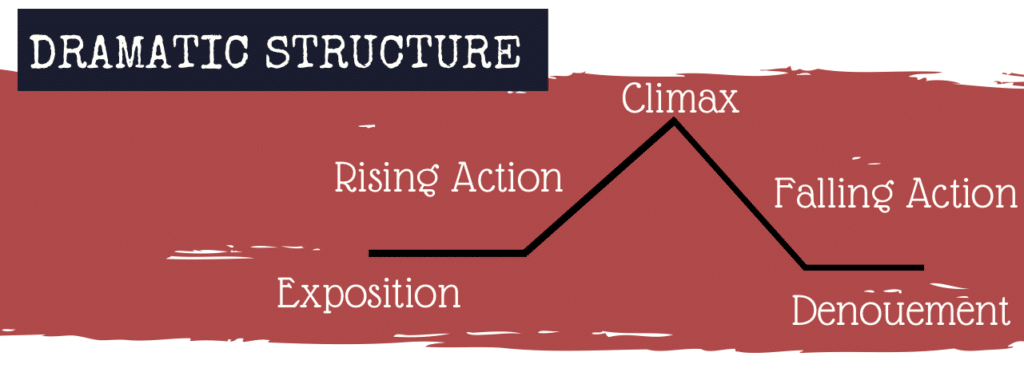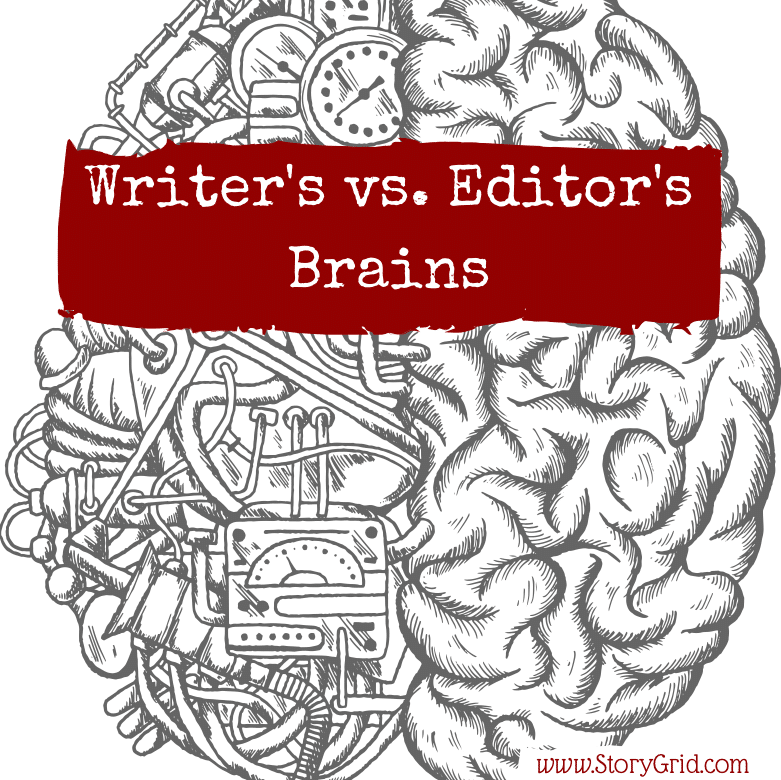We’ve all heard the adage: left- and right-brained people think differently. That we are more or less creative depending on which side dominates. Though there is some research to suggest otherwise, left-brained people are supposedly more analytical compared to their right-brained counterparts. Does that mean that someone who’s excited about The Story Grid’s methodology can’t also be creative? What does it mean to use our writer’s brain compared to our editor’s brain? Can we have both and use each at the appropriate time, or does having one mean we can’t also use the other?
The Story Grid and Analytics
I don’t know about you, but when I found The Story Grid a few years ago, I was ecstatic. I had never before found a method that explained writing as anything more than elusive, unobtainable, for the elite few blessed with genius. Even in AP English I never fully understood how to write well. I knew how to analyze symbolism and take a wild guess behind its meaning, but to try and grasp how to write, or to really understand the stories I loved seemed impossible.
Fast forward a few years and a few wrong turns in life towards more analytical subjects. I found The Story Grid, which compiled materials on story that I didn’t even know existed. Yes I had heard about Dramatic Structure, but I’d never been told that Story has different layers and that each one should include the 5 Commandments. I had never articulated that stories are about change. Nor that, depending on what genre you’re writing in, certain expectations have to be met.

I didn’t know to look at stories I loved to figure out what they did well. And I certainly didn’t think I’d ever find a method for analyzing a story that communicated what worked, what didn’t, and how to fix anything that needed to be improved.
All that opened up the doors to analyzing stories (something I do on my personal blog). I started making foolscaps for every book I read and became the most annoying person in the movie theater: predicting what came next or explaining a certain plot-type. For example, Guardians of the Galaxy Vol. 2 includes a redemption plot for Yondu, which I knew as soon as they mentioned his potential funeral.
Shawn Coyne vs. Steve Pressfield
But what about the writing side of things? Isn’t that what I set out to do in the first place? Become a better writer. Did analyzing stories actually help me to write better, or was it moving me further away? Especially considering I haven’t seriously worked on a novel since finishing my first (shitty) first draft.
Finding The Story Grid (and training to become a Story Grid certified Developmental Editor directly with Shawn) got me thinking about his relationship with Steven Pressfield. And how Shawn is the “left-brained” analyzer to Steve’s “right-brained” creativity. If I identify more with Shawn (we both have degrees in biochemistry for goodness sake), can I still learn to write like Steve or am I forever cast into the editor category? Is that something I can live with or do I want to keep trying to write?
All of these things I have to answer for myself. I’m not sure if you do too. Considering you’re interested in The Story Grid methodology, perhaps, though I make no judgements. But, it’s silly to think that it’s somehow less-than if I never write fiction myself. If I instead help other people learn to write theirs better. Yet, I struggle with having the urge to write. (And with wanting to write well, for that matter.)
And that’s something I think many people can relate to, whether they choose to write, to share what they write, or to just enjoy stories from afar. Everyone has a gift to share with the world.
Creativity – Putting Your Butt in the Chair
The thing I think many people forget, and that Steve speaks to, is that creativity is just as much work as it is fun. It’s not about sitting down at your desk whenever you feel like it and having a story pop out from the ether fully formed on the page. In fact, it’s almost the opposite of that for most people.
To be creative, and to do it well, you have to actually put in the work. Every. Single. Day. And it’s hard. You’ll probably never “feel like” writing in the way most people expect to. Stories won’t come out perfectly the first time. Far from it. It will sometimes take years to get what you want to actually show up on the page. And, most of the time it will be in a way that you don’t expect it to.
Creativity is intangible. The practice of writing is not. It’s just as much work as your 9-5. Probably more so because it’s not required in the same way. You won’t get fired for not showing up. Instead, you’ll stare down the end of your life some day wondering why you never made the time to get your novel out there.
That’s what I keep thinking, anyway.
And for those like me, just know that you get better at what you progressively do. You won’t know what kind of novel you can produce if you don’t put in the time to learn your craft and get better at writing. One day you’ll find you’ve improved your writing enough to actually write what you intend to.

Editing, on the other-hand feels almost like procrastination.
It’s taking a blob of clay and problem-solving your way through to making it work. It’s analyzing a story you love and figuring out why you love it. And analysis works in my brain in a way creativity does not. Or rather, doesn’t like to.
In a way, I love editing just as deeply. But, of course, differently.
Editing is important when it comes to putting your work out into the world. First drafts aren’t supposed to be perfect. They take time and patience to really turn into something worth sharing. That’s where my job comes in. But sometimes I forget that you have to have something on the page before you can actually edit it.
Find a Method that Works for You
Maybe you’re inspired to write by The Story Grid. Perhaps you just to use it as an editing tool. (And, might I say, the best editing tool ever, though I admit I’m biased.) The best advice I can offer you, from one writer to another, is to find a method that works for you and just do it. Put in the work. Set a timer. Make a schedule. Get the words on the page whether you go kicking and screaming or not. Listen to your Resistance, tell it you appreciate its concerns, but that it can go f— well you know.
Whatever it takes. Don’t give up on your creative dream. You need to bring it into the world. The world needs your authenticity and your bravery. Get the words on the page.
As for other methods you can try (both for editing and writing), here’s a few books I recommend:
- The War of Art by Steven Pressfield
- Story Engineering by Larry Brooks
- Structuring Your Novel by K.M. Weiland
- Bird by Bird by Anne Lamott
- Writing Down the Bones by Natalie Goldberg
- The Bestseller Code by Jodie Archer, Matthew L. Jockers
- Story by Robert McKee
- The Breakout Novel by Donald Maass
- (And many, many others)
Who am I to tell you whether to write, edit, or do both?
No one. I’m just a story nerd who finds that writing and analyzing stories fill my life with meaning in a way little else can. I’m also putting advice I need to hear out into the world in hopes that it will help me too.
I am a struggling creative. A writing junkie. A story addict.
But one thing I have going for me is that I know what I’m up against. I know the story principles from researching The Story Grid and reading every other method I could get my hands on. I know Resistance when I see it. And, I know what it’s like to wake up one day wondering where all that time went when I said I was going to write that novel a year ago.
Luckily, I still have the time. I believe you do too.
Go write. (Or do whatever it is you love.)